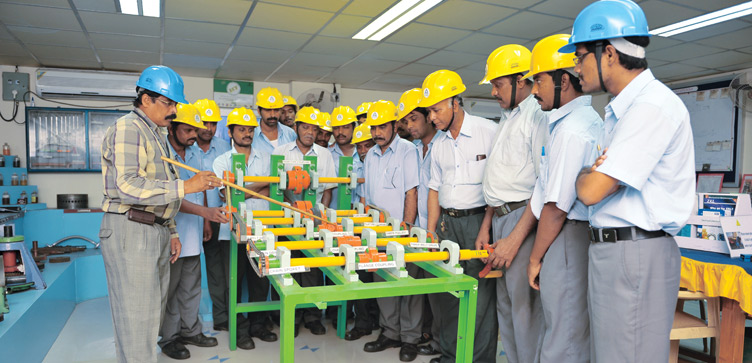Social Performance
Labour Practices and Decent Work
Our human resource management systems and processes aim at creating a responsive, customer-centric and market focused culture that enhances organisational capability and vitality. Our unique employee value proposition backed by strong corporate equity enabled sustained engagement in challenging times.
During 2011-12, our full-time direct employees numbered almost 31,000 of which nearly 2,278 employees in the Leaf Tobacco business were engaged on a seasonal basis due to the very nature of the business.
In addition, aproximately 11,887 employees of service providers were engaged during this period. Our significant operations are in India except for one subsidiary company in Nepal, which employed around 526 full-time direct employees and 290 employees of service providers.
The different value chains related to our Businesses provided indirect employment to over 5 million people, whose livelihoods were substantially linked to their association with the Company. Indirect employment covers the supply and distribution network, agri-sourcing, social and farm forestry, e-Choupals, women’s empowerment and micro-enterprises and livestock development.
Over 13,000 of our direct employees are members of various unions. Employees were aligned and involved in the implementation of significant investments in technology and process improvements aimed at enhancing productivity, quality and delivery effectiveness. The harmonious relations at all operating Units is a reflection of the Company’s approach to employee engagement focusing on a collaborative approach and mutuality of interests. There have been no disputes in ITC Units, nor has the Company lost any workbase on account of the same during 2011-12.
Our remuneration philosophy recognises performance and meritocracy, whilst being competitive and sustainable. This is reflected in the total employee cost of Rs.1265 crores during 2011-12, which represents an 11% compounded annual growth over the last three years.
 |
Our human resource management systems and processes aim at creating a responsive, customer-centric and market focused culture that enhances organisational capability and vitality
|
Attrition
The unique value proposition and the integrated approach to managing human resources is anchored on ITC’s Group Philosophy and ITC’s HR Philosophy. This enabled significant attraction, retention and motivation of employees. The overall attrition across management and non-management employees for 2011-12 was 14%. Within the management cadre*, attrition was 11%.
* Management cadre consists of managers in Responsibility Levels 1 to 8 and does not include managers working with subsidiaries of ITC Limited
Learning and Development
ITC’s Learning and Development initiatives are powered by a strong Learning & Development Vision - ‘Build ITC’s talent and leadership pipeline to power our engines of growth and enhance organisational capability to compete, win in the market place and create enduring value for our shareholders and society.’ The Capability Development Agenda flows from ITC’s Mission, ITC’s Strategic Agenda, the 3-Horizon Growth Strategy and ITC’s Vision.
Learning and Development initiatives offered during 2011-12 were aligned with this agenda. The on-going core programmes were revitalised to reflect the emerging capability requirements. In addition to core programmes, customised programmes were also offered to address the needs expressed by businesses, aimed at building specific capabilities at various levels of the organisation.
Planning for initiatives in this area begins much before the commencement of the year and flows from the various Business Plans and capability requirements emerging thereof.
Business HR teams work closely with the Corporate HR team in actuating the initiatives for Learning and Development. Employee training at the factory level is undertaken after assessment of skill gap or after evaluation of emergent technology or skill needs. The process is proactive and well- structured.
In 2011-12, over 1,26,000 person-days of formal training were organised for employees at various levels. In addition, on-the-job learning opportunities were provided to a cross-section of employees supported by inputs from peers and superiors.
 |
In 2011-12, over 1,26,000 person-days of formal training were organised for employees at various levels. In addition, on-the-job learning opportunities were provided to a cross-section of employees supported by inputs from peers and superiors
|
Social Performance
Labour Practices and Decent Work
Our human resource management systems and processes aim at creating a responsive, customer-centric and market focused culture that enhances organisational capability and vitality. Our unique employee value proposition backed by strong corporate equity enabled sustained engagement in challenging times.
During 2011-12, our full-time direct employees numbered almost 31,000 of which nearly 2,278 employees in the Leaf Tobacco business were engaged on a seasonal basis due to the very nature of the business.
In addition, aproximately 11,887 employees of service providers were engaged during this period. Our significant operations are in India except for one subsidiary company in Nepal, which employed around 526 full-time direct employees and 290 employees of service providers.
The different value chains related to our Businesses provided indirect employment to over 5 million people, whose livelihoods were substantially linked to their association with the Company. Indirect employment covers the supply and distribution network, agri-sourcing, social and farm forestry, e-Choupals, women’s empowerment and micro-enterprises and livestock development.
Over 13,000 of our direct employees are members of various unions. Employees were aligned and involved in the implementation of significant investments in technology and process improvements aimed at enhancing productivity, quality and delivery effectiveness. The harmonious relations at all operating Units is a reflection of the Company’s approach to employee engagement focusing on a collaborative approach and mutuality of interests. There have been no disputes in ITC Units, nor has the Company lost any workbase on account of the same during 2011-12.
Our remuneration philosophy recognises performance and meritocracy, whilst being competitive and sustainable. This is reflected in the total employee cost of Rs.1265 crores during 2011-12, which represents an 11% compounded annual growth over the last three years.
Attrition
The unique value proposition and the integrated approach to managing human resources is anchored on ITC’s Group Philosophy and ITC’s HR Philosophy. This enabled significant attraction, retention and motivation of employees. The overall attrition across management and non-management employees for 2011-12 was 14%. Within the management cadre*, attrition was 11%.
* Management cadre consists of managers in Responsibility Levels 1 to 8 and does not include managers working with subsidiaries of ITC Limited
Learning and Development
ITC’s Learning and Development initiatives are powered by a strong Learning & Development Vision - ‘Build ITC’s talent and leadership pipeline to power our engines of growth and enhance organisational capability to compete, win in the market place and create enduring value for our shareholders and society.’ The Capability Development Agenda flows from ITC’s Mission, ITC’s Strategic Agenda, the 3-Horizon Growth Strategy and ITC’s Vision.
Learning and Development initiatives offered during 2011-12 were aligned with this agenda. The on-going core programmes were revitalised to reflect the emerging capability requirements. In addition to core programmes, customised programmes were also offered to address the needs expressed by businesses, aimed at building specific capabilities at various levels of the organisation.
Planning for initiatives in this area begins much before the commencement of the year and flows from the various Business Plans and capability requirements emerging thereof. Business HR teams work closely with the Corporate HR team in actuating the initiatives for Learning and Development. Employee training at the factory level is undertaken after assessment of skill gap or after evaluation of emergent technology or skill needs. The process is proactive and well- structured.
In 2011-12, over 1,26,000 person-days of formal training were organised for employees at various levels. In addition, on-the-job learning opportunities were provided to a cross-section of employees supported by inputs from peers and superiors.